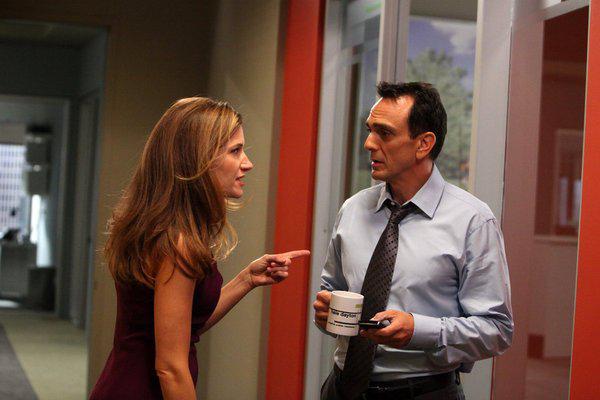When The Playboy Club received its foreclosure notice on Tuesday, the only real surprise was that it beat Free Agents to the chop. That show—which starred Hank Azaria and Kathryn Hahn as Alex and Helen, co-workers with occasional benefits—survived until today. Personally, I wish the show had survived at least one more week. That way, we would have had the unusual pleasure of watching an American remake on U.S. television concurrently with the U.K. original: The British version begins its run on BBC America Saturday.
Rarely can we compare competing national versions of a TV show without resorting to YouTube or downloads of questionable legality. And watching the two incarnations side by side is a useful, if dispiriting, exercise. The U.S. version, sad to say, was a bad photocopy of the British original: While the central premise of two lovelorn office-mates who hook up occasionally remained the same, everything else was degraded and hard to read.
The U.S. Free Agents might have worked on premium cable: the comedic style is, as in the original, a mixture of banter and excruciating awkwardness, both better suited to the no-holds-barred world of HBO or Showtime. (Think Entourage or Extras, only funny.) The biggest loss comes with the language. The British show is prolifically profane; NBC’s version, though part of this season’s trend of using the V word, was a network show that aired at 8:30: No adult language allowed.
(And, unfortunately, BBC America viewers won’t get to experience the full creative wordplay of British blue humor: That channel generally censors the really bad words. A spokesman told me there will indeed be some bleeping: “The dialogue is certainly creative; editing just has to get creative along with it to ensure the sharp comedy comes through clearly, while still remaining cognizant and respectful of our audiences.” It’s a shame. Although not quite at In the Loop levels, Free Agents’ swearing is extremely amusing—and so frequent that, if bleeped, entire scenes could sound like a test of the emergency broadcasting system.)
To be fair to the American show, there was one scene where its euphemisms brought a bigger laugh. In the opening episode, when the boss demands that Alex (Azaria in the United States; Stephen Mangan in Britain) recount his previous night’s sexual exploits, Mangan’s recital of experts-only sex acts is merely shocking; Azaria’s goofy inventions are chuckle-inducing.
On a panel called “Bravura Television” at this weekend’s New Yorker Festival, Tad Friend posited that in the United States, network shows are about characters we’d want in our lives, while cable focuses on interesting people we’d prefer to avoid. The two versions of Free Agents exhibit a similar dichotomy. Alex and Helen are smart and funny in both, but the surrounding cast is far less likable in the Channel 4 original. In Britain, the boss—played in both countries by Anthony Head—is a gross, manipulative, sex-obsessed bully; in America, he’s a rogue with a heart of gold. In Britain, Alex’s assistant is an insubordinate, inappropriate bitch; in America she’s an Asperger-y mean girl. In Britain, their co-workers are ambitious brutes; in America they’re pathetic losers.
The American version was also oddly claustrophobic. While the Brits are always bolting out of the office and onto the streets of London, where they shop and eat and see films and plays (they’re theatrical agents; the Yanks work at an advertising agency), the Oregonians seem never to enjoy the gorgeous Portland scenery. (A few scenic views in the credit sequence and some sports logos on the office’s walls barely establish the location.)
A decade ago, when writing about another crop of British imports, I bemoaned American television’s avoidance of pop-culture references. That’s still evident here. The U.S. show stuck to broad, bland targets like cable-company service “windows” and book clubs. The Brits, meanwhile, name-drop real celebrities: Gordon Ramsay, Nelson Mandela, Anna Nicole Smith, Sarah Michelle Gellar. Still, in the two episodes I watched, I encountered just one set of names that may be unfamiliar to some American viewers: Richard and Judy, who could charitably be described as the British Oprah, if Oprah were a married couple. Surely the lesson here is that Americans understand their British cousins without needing NBC, or anyone else, to translate.
